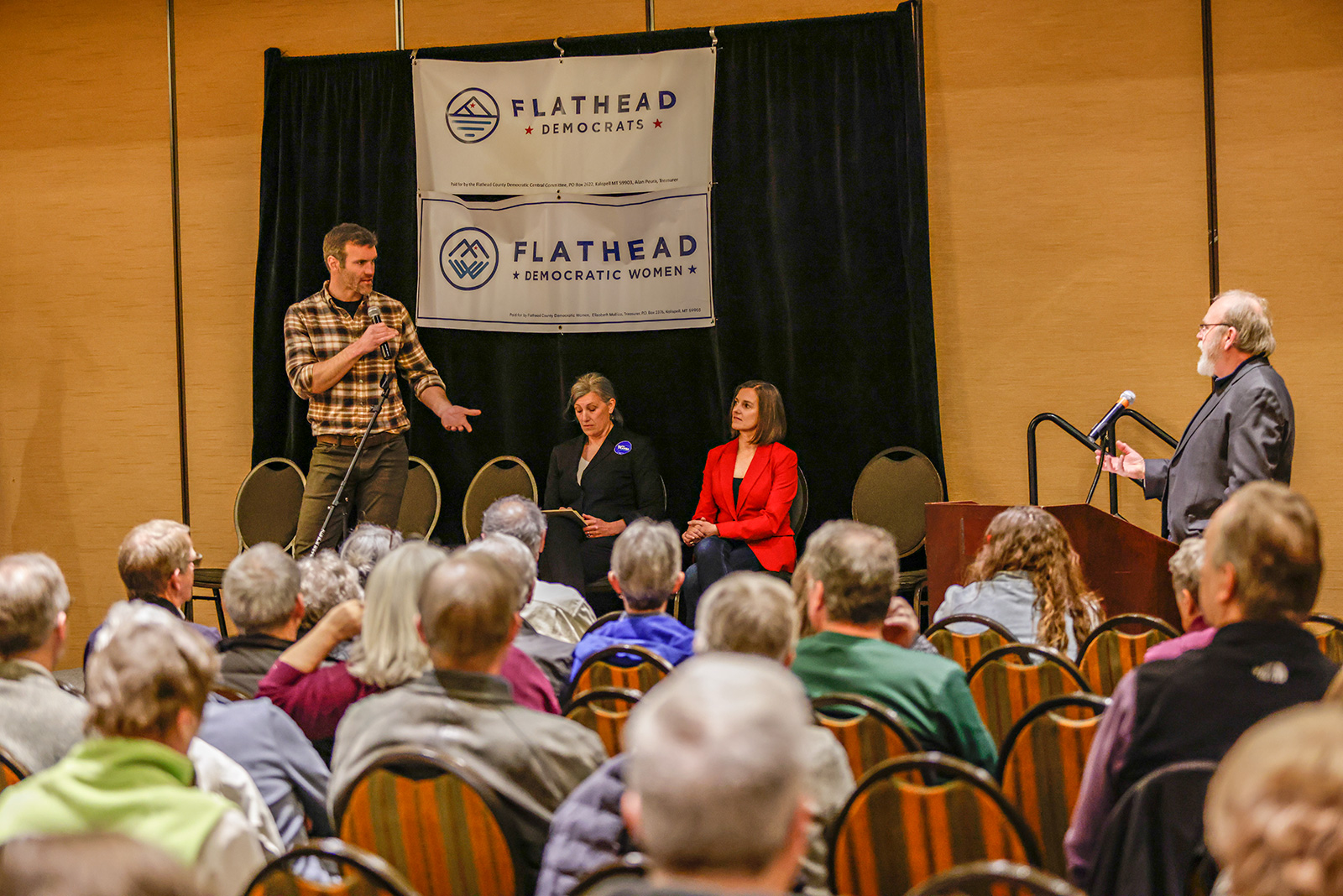Democratic Congressional Hopefuls Converge on Kalispell
Higher wages, affordable housing emerge as prominent campaign planks of three candidates vying for party nod to represent Montana’s western congressional district
By Tristan Scott
Last year, when Montana regained a second congressional district for the first time since 1990, national Democratic leaders immediately recognized the Treasure State as a tough but critical battleground state for the party to win this November if it hopes to maintain its razor-thin majority in the U.S. House.
Despite recent political analysis suggesting that victory is going to be an uphill battle for Democrats heading into this midterm primary election, three Democratic candidates for the western congressional district of the U.S. House of Representatives brought their progressive platforms to Kalispell last week. Attending a forum sponsored by the Flathead Democrats that drew more than 150 attendees, the candidates proved that, even in the conservative enclaves of northwest Montana, the party is energized as it seeks to nominate a candidate to win the newly minted congressional district and represent working-class Montana families.
If history is any guide, midterm elections tend to favor the party that does not control the White House, but none of the candidates at last week’s forum were cowed by those historical data points as they pledged to work toward solutions for Montana residents whose livelihoods have been staggered by an inaccessible housing market.
The Democratic candidates for Montana’s 1st Congressional District, the western portion of the state, are health-policy expert Cora Neumann, of Bozeman; Missoula attorney Monica Tranel; and former Democratic state representative Tom Winter, of Polson. All three candidates traveled to Kalispell for the April 18 forum and pledged to stand up for Montana.
“Montana needs a fighter in Washington who understands what we’re going through,” Neumann said. “We are in a massive transition now, facing huge challenges but also huge opportunities. We need somebody who will fight to make sure that we have the wages that we need and the housing we can afford. Our state is being bought out from beneath us. And we need someone who will take on corporate special interests and wealthy interests to make sure that Montanans benefits from the growth in Montana.”
Drawing on her experience as an attorney advocating on behalf of ranchers and small businesses and fighting against powerful corporate interests, including NorthWestern Energy’s efforts to shift the risk of power-plant acquisition entirely to ratepayers, Tranel said she’ll stand up for the “little guy” while crafting policy that helps advance the transformation of the global energy sector from fossil-based to zero-carbon.
“We need to reject these false dichotomies that pit energy security against climate reform,” Tranel said. “That is a false binary. We can have both and we must have both.”
Winter, who won a seat in the state Legislature in the 2018 elections in a district won by former Republican President Donald Trump in 2016, and previously ran for Congress in 2020 but lost the Democratic primary to Kathleen Williams with just over 10% of the vote, said he is running again to ensure the state’s voice is heard in Washington D.C.
“This is a part of the state that Democrats often dismiss as a region that is a lost cause. I know that it’s not,” Winter told attendees of last week’s forum. “I’m Polson-based but I do my grocery shopping in Bigfork. What our campaign is proposing is not radical in any way and it shouldn’t dissuade you.”
Winter has also been an unapologetic critic of former Montana Congressman Ryan Zinke, the Republican frontrunner for the western district, taking aim at the amount of time the Whitefish resident has been shown to spend out of state.
“Ryan Zinke is one of the most corrupt people running in the entire country and Donald Trump is going to run for president again and we’ll be right back where we started,” Winter said.
Although the Democratic Party often struggles to field candidates for local elections in the Flathead Valley, and candidates campaigning for federal office tend to focus on liberal enclaves like Missoula, Butte and Bozeman instead of conservative communities in northwest Montana, Flathead Democratic Party Chair Lynn Stanley said she was impressed by the turnout at the forum.
“We were really pleased with attendance,” she said. “There were people standing at the back of the room and we did a Facebook Live video of the forum.”
In terms of fundraising, Neumann is the clear leader, having taken in about $400,000 in the first quarter of 2022, according to her campaign’s reporting, and more than $1.1 million since launching her campaign. Tranel trails behind her in fundraising totals, bringing in about $253,000 in the last quarter and totaling $673,000 since her race began. In the last quarter, Winter raised $42,000, pegging him just shy of $95,000 raised since he entered the race.
Although new analysis shows that both of Montana’s congressional districts are likely to yield Republican winners, with Cook Political Report, the nonpartisan newsletter, rating Montana’s eastern district as solidly Republican and the state’s western district as competitive but likely Republican, the Democratic candidates did not appear to lack confidence in their ability to unite working-class Montanans who are struggling to make ends meet.
“It doesn’t matter where you live or the size of the town, whether it’s Bozeman or Missoula, or Kalispell or Deer Lodge or Twin Bridges, we have a housing crisis in our state,” Neumann said. “We have teachers and nurses living on their friends’ couches. We have working families living in their cars. Montana is being bought out from underneath you and although this growth is creating unprecedented challenges, it is also creating new opportunities.”